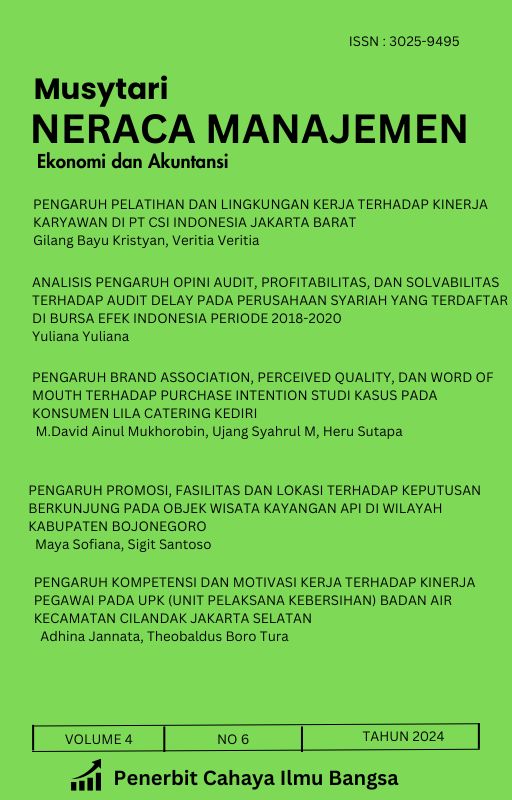Published 2025-05-30
Keywords
- Waqf,
- Islamic Economics,
- Welfare,
- Society
How to Cite
Abstract
This study reviews the important role of waqf in improving social welfare from an Islamic economic perspective. Using a qualitative method based on literature studies, this study examines various references such as scientific articles, research results, and official documents that discuss waqf and its role in social and economic development. As one of the instruments of Islamic economics, waqf has great potential in creating a fair and equitable distribution of wealth, especially in supporting the education sector, health services, community economic empowerment, and poverty reduction. The results of the study show that if managed professionally, transparently, and in accordance with sharia principles, waqf can be the main foundation for sustainable development. In addition to providing spiritual value, waqf can also strengthen the economic structure of the community and reduce social inequality. Therefore, it is necessary to strengthen institutions, regulations, and innovation in waqf management so that its benefits can be optimized to create a more prosperous and inclusive society.
References
- [1] Andre Syah Nandra, Y. D. K. (2024). Ekonomi syariah: definisi, konsep dan manfaat. 130–139.
- [2] Astri, L. P. V., Hartati, S., Taufik, M. Z., Hidayat, R., Hutauruk, T. R., Kusuma, A. R., Ningsih, W., Nurdin, N., Iswandi, A., Ridwan, M., Nursyabani, N., Putera, R. E., Kusdarini, K., Ayu, W., Sari, N., Rezzylina Dwi Akhirulyati, Andrew Ari Fardana, Muhammad Yasin, Saputri, O. B., … Malla Avila, D. E. (2022). Aspek Manajemen Risiko dalam Pengembangan Wakaf Produktif. Journal Ekonomi Dan Bisnis Islami, 2(1), 2003–2005.
- [3] Bakar, A. (2020). Prinsip Ekonomi Islam Di Indonesia Dalam Pergulatan Ekonomi Milenial. SANGAJI: Jurnal Pemikiran Syariah Dan Hukum, 4(2), 233–249. https://doi.org/10.52266/sangaji.v4i2.491
- [4] Dewi, M., & Yusuf, M. (2020). Implementasi Prinsip-Prinsip Muamalah Dalam Aktivitas Ekonomi Halal. Hukum Ekonomi Syariah, 3(2), 131–144.
- [5] Habibulloh, & Yusroh, M. (2023). E-issn: 2829-6346 p-issn: 2829-6788. 2.
- [6] ITANG, I. (2016). Wakaf Produktif Dalam Meningkatkan Pemberdayaan Ekonomi Umat. ISLAMICONOMIC: Jurnal Ekonomi Islam, 4(2). https://doi.org/10.32678/ijei.v4i2.2
- [7] Masriyah, S., Saroya, S., Fitriyah, A., & Djalaluddin, A. (2024). Peran Wakaf Produktif Dalam Kesejahteraan Masyarakat. 10(01), 627–631.
- [8] Masruroh, S., Eduardus Nanggur, & Ulrianus Aristo Ngamal. (2024). Peran Wakaf dalam Pengembangan Ekonomi Berkelanjutan: Studi Kasus di Indonesia. Indo-Fintech Intellectuals: Journal of Economics and Business, 4(2), 490–500. https://doi.org/10.54373/ifijeb.v4i2.1297
- [9] Maulida, Novita, & Siti Femilivia Aisyah. (2024). Etika Bisnis Islam: Implementasi Prinsip Keadilan Dan Tanggung Jawab Dalam Ekonomi Syariah. El-Iqthisadi Jurnal Hukum Ekonomi Syariah Fakultas Hukum Dan Syariah, 6, 49–61. https://doi.org/10.24252/el-iqthisady.vi.46740
- [10] Syafiq, A. (2018). Pemanfaatan Dana Wakaf Tunai Untuk Pembiayaan Pembangunan Inrastruktur. ZISWAF : Jurnal Zakat Dan Wakaf, 4(1), 25. https://doi.org/10.21043/ziswaf.v4i1.3029
- [11] Syafrina, A. D., Mu’is, A., Afandi, F. N., & Luqman Rabbani Prahasta. (2023). Pengaruh Wakaf dalam Mengentaskan Kemiskinan. Maro; Jurnal Ekonomi Syariah Dan Bisnis, 6(1), 22–29. https://doi.org/10.31949/maro.v6i1.3970
- [12] Syariah, E., Muhammadiyah, U., Barat, S., Lastina, I., Syariah, E., Fitri, R., Syariah, E., Yanti, N., & Wandi, J. I. (2024). Peran Wakaf Dalam Mewujudkan Kesejahteraan Sosial : Perspektif Dari Tafsir Ekonomi Islam. 05(01), 103–111.

